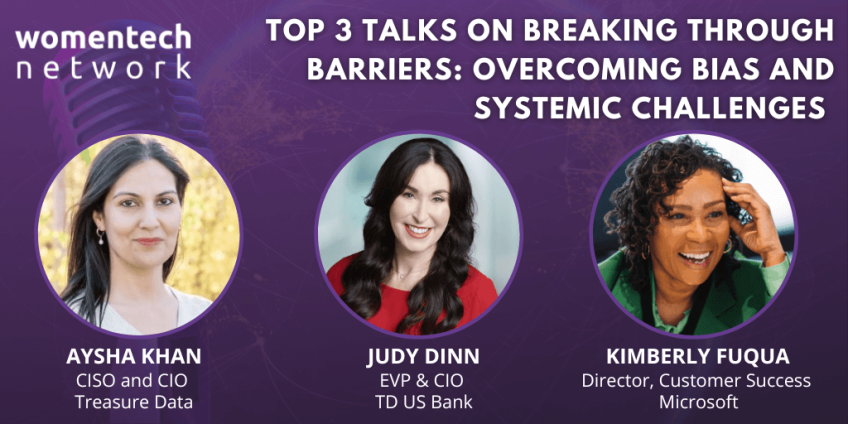Vijaya Kaza Going Beyond Myths and Clichés
A Fresh Take on Career Advice, Confidence, and More: An Insightful Discussion with Vijaya Kaza
Recently, we had the privilege to listen to Vijaya Kaza, the Chief Security Officer at Airbnb share her unique and insightful perspectives on the workspace, career development, self-perception and more. This article discusses key points from her enlightening talk, offering compelling alternatives to conventional career advice and cliches.
Debunking the Myths: Confidence and Courage
Vijaya Kaza began her session by challenging a popular cliche– "fake it till you make it." Highlighting the importance of authenticity, she counters this often-touted piece of advice, stating its potential to lead to imposter syndrome, due to continuous masking of true abilities.
Suggesting an alternative approach, she delves into a fundamental differentiation - understanding the difference between confidence and courage. Confidence, she expresses, is the feeling of self-assurance one gains from acknowledging their own capabilities, whereas courage is the mental strength one employs to overcome obstacles. She vouches for the principle that courage leads to confidence and encourages professionals to validate their abilities from internal experiences rather than external validations.
Self-perception and Gender in the Workplace
Next comes the subject of self-perception in the light of gender issues in the workplace. Vijaya Kaza points out that while gender inequalities and biases indeed exist, it is crucial that we don’t allow our gender to define us or view opportunities and setbacks solely through a gender lens. Rather, she firmly believes that our skills, talent, abilities, and human qualities should be our primary self-defining factors.
Embracing Your Uniqueness
Forcing oneself to blend in and avoiding standing out of the crowd is a common piece of advice. But Vijaya suggests this mindset might hold us back from embracing our unique traits. The differences that set us apart can often generate individuality and help us gain attention and recognition in a crowd.
Feedback - A Gift Worth Weighing
While accepting feedback is championed as a crucial professional skill, not all feedback may be equally valuable or applicable. Vijaya advises that feedback should be evaluated against its context, its conformity to your values and alignment with your career goals.
Setting Career Goals
Another common piece of advice that Vijaya addresses is planning out a five-year career path. She encourages professionals to stay flexible and adaptable in their career planning strategy, focusing on building their career one step at a time, taking into account their specific skill gaps and needed experiences.
Treating Ourselves Kindly
Finally, Vijaya implores professionals to treat themselves kindly. Often, we extend greater kindness and understanding to others than we do to ourselves. She advises professionals to refrain from harsh self-criticisms or negative self-talk.
In conclusion, Vijaya leaves us with a profound piece of advice – always strive to become a better version of yourself today than you were yesterday, to keep progressing in our respective careers and journeys.
Video Transcription
And as we're gonna be Haya on stage here, uh Welcome, welcome. I'm very excited about her. So we're gonna pivot to some of the work that she is doing. We are very lucky to have her today. She is the Chief security Officer of Air BNB.So very uh big company, a lot of things that probably go on with security concerns and um handling. Definitely a lot of data and a lot of innovation in that space is, it has definitely disrupted a lot of traditional um digital transactions in that uh hotel space and they're doing some creative things. So I am gonna hand it over to her and let you share your screen and I will make sure your audio is all good.
Ok, good afternoon, everyone. I'm very glad to be here with all of you. Uh What a great conference. First of all, thank you so much for the organizers with so many awesome talks uh in our session today, we will be going beyond myths and cliches. Well, what does that mean? Exactly in spite of having a lot of advice all around us when it comes to our careers, we are still searching for answers, aren't we? That may be? Because a lot of advice tends to be very cliche generic and not very actionable and sometimes even plain wrong. Today, I will share my take on six such cliches and myths and provide an alternate viewpoint based on my experiences and stories. Mind you some of my views may surprise you or they may actually go against some common wisdom that you heard until now. I'm not saying this is exactly what you should follow. I'm merely sharing a different perspective and I encourage all of you to experiment with these and come to your own conclusions on what works best for you based on your situation. So let's get going. Number one, let's start with the most popular cliche of all times. Anyone not heard this advice about confidence, fake it till you make it. I think this is not only one of the biggest cliches of all times but a potentially dangerous one.
And the reason I say that is we see many successful people say that they have imposter syndrome and that's coming from years of mental conditioning, from hearing bad advice like this. So if you fake anything, of course, you're gonna feel like imposter. Plus we're not really fooling anyone by faking, so do not fake it till you make it. So you may be wondering how do I build my confidence then to get to this answer, we should double click on two topics that are so essential and so foundational, no matter what we do in our lives, courage and confidence, we often mix up courage and confidence. Let me start by defining these terms. Confidence is a feeling of self assurance arising from one's appreciation of one's own abilities. Now, it's a pretty straightforward definition. But the keywords to remember, there are one's appreciation of one's own abilities, that means it's not coming from someone else telling you that you're good at something, but you have to get it from inside of you and no external amount of validation will do it for you. Courage.
On the other hand, is a me your mental strength to face fear or difficulties. So we need courage to face our fears and do something. And the act of doing something will is what will give you that appreciation for your abilities and thereby giving confidence. So courage leads to confidence. You don't need confidence to be courageous. Confidence is the end result of taking courageous actions. I can tell you from my own experience that that's exactly how it works early on in my career. I joined Cisco to work in the routing space. One day, my boss called me into his office and said, hey MJ, I was asked to leave this newly formed business unit that focuses on security. Would you like to come join after I thought about it for a minute? I said yes and went and joined security. I didn't realize this at the time. But as I reflect on it now, I can tell you that was me being courageous and saying yes, because I clearly did not have the confidence back then that I had what it took to be successful in that field. Security was back, uh, back then pretty new and I knew nothing about it. Plus I was also pretty nervous about giving up what was working fine for me and jumping into something new. I'm so glad I faced all those fears and jumped in with 2 ft because um I not only survived, but I really thrived and it turned out to be one of the best decisions of my career.
And after that, as I kept saying yes to more and more opportunities like this, my confidence increased along with that as well. So here's how you can make this actionable for yourself. Let's say you have an opportunity tomorrow to give a talk to work on a new project, do something that you've always been wanting to do for a while. As long as you feel like that could help you grow. Say yes before your inner voice starts creeping in and tells you, hey, you really don't have the time to do it or you don't have any skills to do it or whatever it is that uh you know, inner voice tells you. Um And as you do more and more of these, you will start believing in yourself and your confidence will follow. Now, that's a much more practical way to think about confidence, isn't it? And it doesn't make you uncomfortable in your own skin because there is no faking involved.
So if you only remember one thing from this entire talk today, that is this confidence comes from taking courageous actions, not by faking. This is so important that let me repeat it for you. Confidence comes from taking courageous actions not by faking. Let's move on. Number two, um I attended a woman's seminar once long time ago, it was really really good seminar. The speaker and the facilitator was really entertaining and engaging. She talked about many things that we women do wrong the way we end our sentences in an up to the way we walk, the way we stand, the way we sit without taking up much physical space. And a lot of that advice was really, really good and she had ton of tips for what we could do different while all of that advice is great and something that we should follow, there is one negative side effect, all of this that we should be aware of. The more we keep thinking about our gender, the more central it becomes part of our identity over a period of time due to all the gender centric narrative, what happens is we start seeing everything from that angle and let it impact us much more than it should. So for example, if you don't get an opportunity or first reaction. Maybe, maybe because I'm a woman, I didn't get that opportunity. Now, what I'm saying is really, really important here. I am not saying that there aren't gender inequalities and, and gender biases in work based.
They are very, very real and I'm not blind to that at all. In fact, when I reflect on my own career, not one but two instances come to mind after delivering some really high-value results for the company, I'm talking major accomplishments like turning around under performing business units and launching new products from ground up and creating new product categories.
I still didn't get the promotion or the role that I deserved. And it went to some other men that were my peers, but there were also several other instances where I got the role of the promotion and my peers who were men and arguably it's much more experience than me at the time, um became, um you know, they started reporting to me and I became their boss.
My point is that sometimes things go your way and sometimes they don't, regardless of whether you're a man or a woman. In my case, when things did go my way, if I told myself that I didn't get that because I'm a woman, even though that may be true, it would have impacted me much more deeply and kept me away from doing other great things which led to successes uh later on in other areas, as they say, life is 10% what happens to us and 90% how we react to it.
So, based on these experiences, I strongly believe in this. In the short term, there will be bumps along the way. But in the long run, our skills, talent and capabilities are what will prevail regardless of our gender. So for our own sanity, well being and long term success, we are better off not over rotating on the gender narrative and better off focusing our energy on what we bring to the table. First and foremost, as human beings, we are so much more than our gender, let us not be defined by it. OK. Number three, beyond gender, there are many other attributes that make us unique. Maybe we have a different name, uh different kind of accent, we look different, we dress different, whatever it is that makes you different. And we're often told that, you know, it's better not to stick out. So try to blend in. Um and it's natural to want to see more people like ourselves around us, isn't it? It makes us comfortable and there is strength in numbers, but uh don't think of whatever makes you unique as a disadvantage and please stay away from any advice that and chatter that supports that type of thinking throughout my career.
But I looked around, I've always found myself as someone that is, that looked or sounded different from most of the other people in the room happens all the time, even till today. Initially, that used to bother me a lot. But in reality, I realized that my uniqueness has helped me stand out in the long run. In fact, I vividly remember the first time that I noticed that it was pretty early in my career. I was in a large meeting with many leaders at this company. I was sitting at um at the back of the room and it was a large meeting of some sort uh business review with our newly appointed senior vice president. And there were lots of discussion and questions going on. When I raised my hand and asked a question, everyone turned around and looked at me like, who is this person asking this question? Even though that made me feel a little awkward and weird at the time later on, many of those same people remembered my name and what I said, probably because I wasn't, I was really looking and sounding different from many others in the room and it was easy to stand out and be remembered.
So rather than worry about sticking out, be glad that our uniqueness lets us stand up. It's a slight reframing of the wording, isn't it standing out versus sticking out? But that small change and small reframing can be really, really powerful for you. So remember, whatever makes you unique, it's a, it's a feature not above. So don't try to fix it rather have your unique strengths work for you in your favor. Number four, feedback, a very important topic you're often told that feedback is really something that you should accept unconditionally.
Now that sound advice, but it is a little bit incomplete. All feedback should be welcome but not all feedback should be acted upon. There may be circumstances in which, you know, you may get some feedback and it's probably better that you don't act on it. There are three examples that I can give you in particular. First is, you know, if you're getting feedback from somebody that recently met, you hasn't seen you operating in, in full context. In that case, if the feedback doesn't make sense to you go at it with two or three other people that know you really, really well and actually understand to see if that makes sense. And second is there are times when the feedback itself may be valid, but they may not be, uh it may not be authentic to who you are and it doesn't align with your own values and principles. If that is the case, please feel free to ignore that. And lastly, the feedback may be valid, but it may not align with your career goals at the time. Um For example, this recently happened uh with somebody in my organization based on their skills and expertise, it seemed like this individual could go really broad and take on lead roles on the team, but during the course of the conversation, we realized that this person's interests were really different and they wanted to go deeper in specific areas instead.
So if you are in a situation like that, rather than acting on the feedback, it's ok to have the conversation candidly with the manager or whoever is giving you the feedback and set the right expectation. So feedback is truly like any other gift, I'm sure you don't use all the gifts that you get. But tuck away some of them without using feedback is also very, very similar. Some feedback is best tucked tucked away as well. Number five, this is another famous cliche that we hear frequently, mostly actually coming from our well meaning mentors for the most part, think where you want to be in five years and plan accordingly. Now, I found this advice to be quite useless, especially this day and age when things are changing so rapidly, you don't know where you want to be in five years. And if you don't know that that's totally ok. In fact, it may be better because it keeps you nimble and open minded to new opportunities. So don't worry about a five year plan. Instead, take one step at a time at each step, assess where you are and plan your next step accordingly. That means though you have to be honest with yourself, sit down and figure out what specific gaps do you have in your skills and experience at this point to move your career along and then try to find your next assignment that gives you that, that opportunity to acquire those skills or experiences.
This process is what I found to be very helpful in my career at every step of the way I, I did this many, many times. For example, after running engineering organization for many years, I sat down and asked myself, what is it that I want to do next? I was always interested in broader business aspects. I wanted to formally get more exposure um and experience on that. Um So I took on product management in addition to engineering to get the broader general management experience. Similarly, after working for a large company for a number of years, I thought it would be great to round out my skills by taking my experience and applying it to smaller size companies. So I deliberately made a move from large to medium and from there to start ups in each of those cases. I literally sat down and figured out and wrote my next steps. What type of company, what size of company, what role should I um be looking for? And, and what and even more importantly, what experiences or new skills I expect to gain from that role. And since this is not a fiveyear plan, and it's just the very next step, it becomes very easy to figure that out based on where you are. So in order to build a solid career, keep layering those bricks, one at a time, think of your career as a portfolio of experiences that leverage what you have done previously and build on those ones to take it into new directions. Last.
But not least we are often told, treat others like you want to be treated yourself. I find that in reality, we treat others a lot better than we treat ourselves. We're usually the harshest critics of ourselves, isn't it? Um Boy, sometimes the negative chatter that goes on in our heads like, you know, we could we suck at something or we don't know how to do this. We are a loser, all kinds of things. We could really, really get nasty with ourselves. But when we give feedback to the others, on the other hand, even if it is to someone that we don't like or respect, we don't say things like that. We pick our words very carefully. We try to be objective and not hurt their feelings. So what we really need to do is be kind to your ourselves and treat ourselves like we treat the others. How do we change this? This is honestly one of the hardest things to change, especially if you are someone that, that doesn't want to get complacent and always wants to better yourself. I'm honestly still working on this myself and haven't quite mastered it. But um I will share one technique that I found somewhat helpful rather than generalize the issue. If you deconstruct it into smaller components, make them more tangible, then you can improve on those specific things without being too harsh to yourself.
For example, if you're telling yourself that you're not good at something, let's say cooking, rather than telling yourself that you're not good at cooking in general. Think about what makes you say that maybe you don't get the ratios of ingredients right? And therefore your food doesn't taste or come out as great. If so, maybe you have to follow a tried and tested recipe more closely that way. You're not generalizing or finding which specific aspect you're not good at and work on that to get better at it and and not be completely unreasonable to yourself. Now, that's a simple example, but you can see how you can apply that to other areas as well. We covered a lot of topics today. Uh I will leave you this one final thought in the end, regardless of which kind of advice you follow. If you focus on becoming better today than the person you were yesterday, you will do just great. So let us try and better ourselves every single day. Thank you for listening. Thank
you w inspirational. Lots of things, lots of questions on how we do develop or if we could even develop a fiveyear plan in this world. So it's always good to see another Kindred spirit as well from uh Cisco life. So uh Thanks a lot for that. And uh we're gonna see if there's any questions. I'm waiting to make sure our next speaker is on. We are a little bit delayed and we were missing her. So we've got a few extra minutes, which is awesome. Um And then I like to see um if there's any questions, let's see if there's any questions for you. Any questions? Well, lots of uh great kudos here are motivating. Thanks a lot, genuine human, practical, lots of tips and advice. All of these sessions will be recorded. So we'll uh that's a common question we see here. Uh They like this. Someone heard, love yourself and talk to yourself as you would a loved one. Self love. Always very key. Uh Let's see. Do you have any last bit of advice while I check on the next guest?
No, I think we covered a lot. I know we are running over time. So um happy to answer questions. But otherwise I think we're good.
And do you have a way that you want people to connect with you that you prefer linkedin
is the best way?
OK. Wonderful. I will go ahead and put her linkedin into the chat for you. I'm here to help and here to make this awesome for everybody. So uh this is Nicole and I'm gonna drop her linkedin right in there for you. Uh And I just dropped it. So you should see Nicole Scheffler again. This is Nicole Scheffler and I'm helping MC today. Thank you very much. We'll have
you. Yes.
Yes. Thank you.





